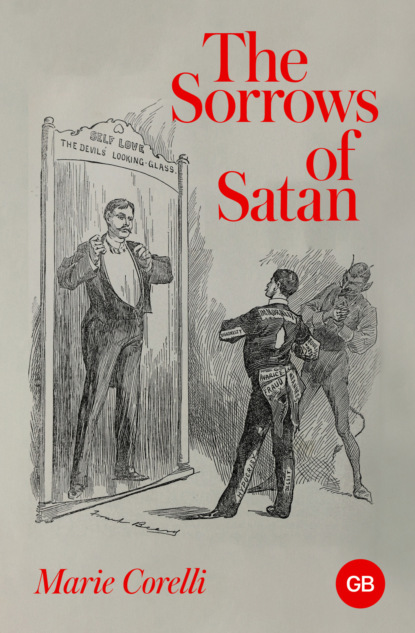По всем вопросам обращайтесь на: info@litportal.ru
(©) 2003-2025.
✖
The Sorrows of Satan
Настройки чтения
Размер шрифта
Высота строк
Поля
He smiled.
“Always! That is, I am always at work endeavouring to gratify every man’s desire. Whether that is good of me, or bad, remains to be proved. Men’s wants are almost illimitable,—the only thing none of them ever seem to wish, so far as I am concerned, is to cut my acquaintance!”
“Why, of course not! After once meeting you, how could they!” I said, laughing at the absurdity of the suggestion.
He gave me a whimsical side-look.
“Their desires are not always virtuous,” he remarked, turning to flick off the ash of his cigar into the grate.
“But of course you do not gratify them in their vices!” I rejoined, still laughing—“That would be playing the part of a benefactor somewhat too thoroughly!”
“Ah now I see we shall flounder in the quicksands of theory if we go any further”—he said—“You forget, my dear fellow, that nobody can decide as to what is vice, or what is virtue. These things are chameleon-like, and take different colours in different countries. Abraham had two or three wives and several concubines, and he was the very soul of virtue according to sacred lore,—whereas my Lord Tom-Noddy in London to-day has one wife and several concubines, and is really very much like Abraham in other particulars, yet he is considered a very dreadful person. ‘Who shall decide when doctors disagree!’ Let’s drop the subject, as we shall never settle it. What shall we do with the rest of the evening? There is a stout-limbed, shrewd wench at the Tivoli, dancing her way into the affections of a ricketty little Duke,—shall we go and watch the admirable contortions with which she is wriggling into a fixed position among the English aristocracy? Or are you tired, and would you prefer a long night’s rest?”
To tell the truth I was thoroughly fatigued, and mentally as well as physically worn out with the excitements of the day,—my head too was heavy with the wine to which I had so long been unaccustomed.
“Upon my word I think I would rather go to bed than anything—” I confessed—“But what about my room?”
“Oh, Amiel will have attended to that for you,—we’ll ask him.” And he touched the bell. His valet instantly appeared.
“Have you got a room for Mr Tempest?”
“Yes, your Excellency. An apartment in this corridor almost facing your Excellency’s suite. It is not as well furnished as it might be, but I have made it as comfortable as I can for the night.”
“Thanks very much!” I said—“I am greatly obliged to you.”
Amiel bowed deferentially.
“Thank you, sir.”
He retired, and I moved to bid my host good-night. He took my proffered hand, and held it in his, looking at me curiously the while.
“I like you, Geoffrey Tempest;” he said—“And because I like you, and because I think there are the makings of something higher than mere earthy brute in you, I am going to make you what you may perhaps consider rather a singular proposition. It is this,—that if you don’t like me, say so at once, and we will part now, before we have time to know anything more of each other, and I will endeavour not to cross your path again unless you seek me out. But if on the contrary, you do like me,—if you find something in my humour or turn of mind congenial to your own disposition, give me your promise that you will be my friend and comrade for a while, say for a few months at any rate. I can take you into the best society, and introduce you to the prettiest women in Europe as well as the most brilliant men. I know them all, and I believe I can be useful to you. But if there is the smallest aversion to me lurking in the depths of your nature”—here he paused,—then resumed with extraordinary solemnity—“in God’s name give it full way and let me go,—because I swear to you in all sober earnest that I am not what I seem!”
Strongly impressed by his strange look and stranger manner, I hesitated one moment,—and on that moment, had I but known it, hung my future. It was true,—I had felt a passing shadow of distrust and repulsion for this fascinating yet cynical man, and he seemed to have guessed it. But now every suspicion of him vanished from my mind, and I clasped his hand with renewed heartiness.
“My dear fellow, your warning comes too late!” I said mirthfully—“Whatever you are, or whatever you choose to think you are, I find you most sympathetic to my disposition, and I consider myself most fortunate in knowing you. My old friend Carrington has indeed done me a good turn in bringing us together, and I assure you I shall be proud of your companionship. You seem to take a perverse delight in running yourself down!—but you know the old adage, ‘the devil is not so black as he is painted’?”
“And that is true!” he murmured dreamily—“Poor devil! His faults are no doubt much exaggerated by the clergy! And so we are to be friends?”
“I hope so! I shall not be the first to break the compact!”
His dark eyes rested upon me thoughtfully, yet there seemed to be a lurking smile in them as well.
“Compact is a good word”—he said—“So,—a compact we will consider it. I meant to improve your material fortunes,—you can dispense with that aid now; but I think I can still be of service in pushing you on in society. And love—of course you will fall in love if you have not already done so,—have you?”
“Not I!” I answered quickly, and with truth—“I have seen no woman yet who perfectly fulfils my notions of beauty.”
He burst out laughing violently.
“Upon my word you are not wanting in audacity!” he said—“Nothing but perfect beauty will suit you, eh? But consider, my friend, you, though a good-looking well-built man, are not yourself quite a Phœbus Apollo!”
“That has nothing to do with the matter”—I rejoined—“A man should choose a wife with a careful eye to his own personal gratification, in the same way that he chooses horses or wine,—perfection or nothing.”
“And the woman?”—Rimânez demanded, his eyes twinkling.
“The woman has really no right of choice”—I responded,—for this was my pet argument and I took pleasure in setting it forth—“She must mate wherever she has the chance of being properly maintained. A man is always a man,—a woman is only a man’s appendage, and without beauty she cannot put forth any just claim to his admiration or his support.”
“Right!—very right, and logically argued!”—he exclaimed, becoming preternaturally serious in a moment—“I myself have no sympathy with the new ideas that are in vogue concerning the intellectuality of woman. She is simply the female of man,—she has no real soul save that which is a reflex of his, and being destitute of logic, she is incapable of forming a correct opinion on any subject. All the imposture of religion is kept up by this unmathematical hysterical creature,—and it is curious, considering how inferior a being she is, what mischief she has contrived to make in the world, upsetting the plans of the wisest kings and counsellors, who as mere men, should undoubtedly have mastered her! And in the present age she is becoming more than ever unmanageable.”
“It is only a passing phase”—I returned carelessly—“A fad got up by a few unloved and unlovable types of the feminine sex. I care very little for women—I doubt whether I shall ever marry.”
“Well you have plenty of time to consider, and amuse yourself with the fair ones, en passant”—he said watching me narrowly—“And in the meantime I can take you round the different marriage-markets of the world if you choose, though the largest one of them all is of course this very metropolis. Splendid bargains to be had, my dear friend!—wonderful blonde and brunette specimens going really very cheap. We’ll examine them at our leisure. I’m glad you have yourself decided that we are to be comrades,—for I am proud;—I may say damnably proud;—and never stay in any man’s company when he expresses the slightest wish to be rid of me. Good-night!”
“Good-night!” I responded. We clasped hands again and they were still interlocked, when a sudden flash of lightning blazed vividly across the room, followed instantaneously by a terrific clap of thunder. The electric lights went out, and only the glow of the fire illumined our faces. I was a little startled and confused,—the prince stood still, quite unconcerned, his eyes shining like those of a cat in the darkness.
“What a storm!” he remarked lightly—“Such thunder in winter is rather unusual. Amiel!”
The valet entered, his sinister countenance resembling a white mask made visible in the gloom.
“These lamps have gone out,”—said his master—“It’s very odd that civilized humanity has not yet learned the complete management of the electric light. Can you put them in order, Amiel?” “Yes, your excellency.” And in a few moments, by some dexterous manipulation which I did not understand and could not see, the crystal-cased jets shone forth again with renewed brilliancy. Another peal of thunder crashed overhead, followed by a downpour of rain.
“Really remarkable weather for January,”—said Rimânez, again giving me his hand—“Good-night my friend! Sleep well.”
“If the anger of the elements will permit!” I returned, smiling.
“Oh, never mind the elements. Man has nearly mastered them or soon will do so, now that he is getting gradually convinced there is no Deity to interfere in his business. Amiel, show Mr Tempest to his room.”
Amiel obeyed, and crossing the corridor, ushered me into a large, luxurious apartment, richly furnished, and lit up by the blaze of a bright fire. The comforting warmth shone welcome upon me as I entered, and I who had not experienced such personal luxury since my boyhood’s days, felt more than ever overpowered by the jubilant sense of my sudden extraordinary good fortune. Amiel waited respectfully, now and then furtively glancing at me with an expression which to my fancy had something derisive in it.
“Is there anything I can do for you sir?” he inquired.
“No thank you,”—I answered, endeavouring to throw an accent of careless condescension into my voice—for somehow I felt this man must be kept strictly in his place—“you have been very attentive,—I shall not forget it.”
A slight smile flickered over his features.
“Much obliged to you, sir. Good-night.”
And he retired, leaving me alone. I paced the room up and down more dreamily than consciously, trying to think,—trying to set in order the amazing events of the day, but my brain was still dazed and confused, and the only image of actual prominence in my mind was the striking and remarkable personality of my new friend Rimânez. His extraordinary good looks, his attractive manner, his curious cynicism which was so oddly mixed with some deeper sentiment to which I could not give a name, all the trifling yet uncommon peculiarities of his bearing and humour haunted me and became indissolubly mingled as it were with myself and all the circumstances concerning me. I undressed before the fire, listening drowsily to the rain, and the thunder which was now dying off into sullen echoes.
“Geoffrey Tempest, the world is before you—” I said, apostrophizing myself indolently—“you are a young man,—you have health, a good appearance, and brains,—added to these you now have five millions of money, and a wealthy prince for your friend. What more do you want of Fate or Fortune? Nothing,—except fame! And that you will get easily, for now-a-days even fame is purchaseable—like love. Your star is in the ascendant,—no more literary drudgery for you my boy!—pleasure and profit and ease are yours to enjoy for the rest of your life. You are a lucky dog!—at last you have your day!”
I flung myself upon the soft bed, and settled myself to sleep,—and as I dozed off, I still heard the rumble of heavy thunder in the distance. Once I fancied I heard the prince’s voice calling “Amiel! Amiel!” with a wildness resembling the shriek of an angry wind,—and at another moment I started violently from a profound slumber under the impression that someone had approached and was looking fixedly at me. I sat up in bed, peering into the darkness, for the fire had gone out;—then I turned on a small electric night-lamp at my side which fully illumined the room,—there was no one there. Yet my imagination played me such tricks before I could rest again that I thought I heard a hissing whisper near me that said—
“Peace! Trouble him not. Let the fool in his folly sleep!”
V
The next morning on rising I learned that ‘his excellency’ as Prince Rimânez was called by his own servants and the employés of the ‘Grand,’ had gone out riding in the Park, leaving me to breakfast alone. I therefore took that meal in the public room of the hotel, where I was waited upon with the utmost obsequiousness, in spite of my shabby clothes, which I was of course still compelled to wear, having no change. When would I be pleased to lunch? At what hour would I dine? Should my present apartment be retained?—or was it not satisfactory? Would I prefer a ‘suite’ similar to that occupied by his excellency? All these deferential questions first astonished and then amused me,—some mysterious agency had evidently conveyed the rumour of my wealth among those best fitted to receive it, and here was the first result. In reply I said my movements were uncertain,—I should be able to give definite instructions in the course of a few hours, and that in the meantime I retained my room. The breakfast over I sallied forth to go to my lawyers, and was just about to order a hansom when I saw my new friend coming back from his ride. He bestrode a magnificent chestnut mare, whose wild eyes and strained quivering limbs showed she was fresh from a hard gallop and was scarcely yet satisfied to be under close control. She curveted and danced among the carts and cabs in a somewhat risky fashion, but she had her master in Rimânez, who if he had looked handsome by night looked still more so by day, with a slight colour warming the natural pallor of his complexion and his eyes sparkling with all the zest of exercise and enjoyment. I waited for his approach, as did also Amiel, who as usual timed his appearance in the hotel corridor in exact accordance with the moment of his master’s arrival. Rimânez smiled as he caught sight of me, touching his hat with the handle of his whip by way of salutation.

















